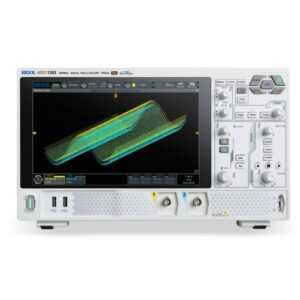In today’s era of rapid electronics innovation, the need for accurate, real-time signal monitoring has never been more critical. Whether you’re an electronics engineer, an educator, a student, or a technician, the best digital oscilloscope is an indispensable tool in your lab or workstation. It not only enables you to visualize electrical signals but also allows you to analyze voltage fluctuations, waveforms, and transient events with precision.

What Is a Digital Oscilloscope?
A digital oscilloscope is an electronic test instrument that captures, displays, and analyzes electrical signal voltages over time. Unlike analog scopes, the best digital oscilloscope offers storage, advanced triggering, automated measurements, and data sharing capabilities. With intuitive graphical interfaces and high-speed processing, these instruments have become essential in a wide range of industries including telecommunications, automotive, power electronics, and embedded systems.
Why Choosing the Best Digital Oscilloscope Matters
Selecting the best digital oscilloscope can make or break your testing accuracy. High-quality oscilloscopes feature better bandwidth, real-time sampling rates, and deep memory, allowing professionals and researchers to diagnose and troubleshoot circuits faster and more efficiently.
Benefits of using the best digital oscilloscope include:
- Clear Visualization of Waveforms
Advanced digital displays provide sharp, detailed waveform views. - Accurate Signal Analysis
With powerful FFT capabilities and automated measurements, you can extract signal details with ease. - Ease of Use and Portability
Many of the best digital oscilloscopes are compact, lightweight, and user-friendly. - Connectivity and Storage
USB ports, LAN, and built-in memory allow users to save and transfer data effortlessly.
Features to Look for in the Best Digital Oscilloscope
When searching for the best digital oscilloscope, here are the most critical features to consider:
1. Bandwidth
Bandwidth determines the frequency range the oscilloscope can accurately measure. For general-purpose work, 50 MHz to 100 MHz is adequate. For high-speed or RF applications, consider 500 MHz or more.
2. Sample Rate
The sample rate should be at least 5 times the bandwidth for accurate waveform representation. The best digital oscilloscopes offer real-time sample rates of 1 GSa/s or higher.
3. Channel Count
More channels allow you to measure multiple signals simultaneously. Two-channel scopes are common, but 4 or more are useful in embedded system diagnostics.
4. Memory Depth
Deep memory ensures long waveform capture without losing detail. Look for models with at least 10k points per channel.
5. Display Quality
A large, high-resolution color screen makes waveform interpretation easier.
6. Trigger Options
Edge, pulse, video, and serial decoding triggers help isolate and analyze specific parts of a signal.
7. Software and Connectivity
The best digital oscilloscope comes with PC software and connectivity options such as USB, Ethernet, or Wi-Fi for remote access and data export.
Applications of the Best Digital Oscilloscope
The best digital oscilloscope plays a crucial role in various domains:
- Electronics Design & Development
For debugging PCBs, verifying signal integrity, and ensuring circuit performance. - Education & Training
Perfect for physics and engineering labs, enabling students to visualize concepts in real time. - Automotive Diagnostics
Used to analyze CAN signals, ignition systems, and engine control units. - Power Electronics
Analyze switching circuits, inverters, and power supplies. - Embedded Systems
Monitor UART, I2C, SPI protocols and debug microcontroller interfaces.
Affordable Options in the Market
You don’t have to break the bank to get the best digital oscilloscope. There are numerous budget-friendly models that offer excellent features suitable for hobbyists, educators, and professionals alike. Many of these models provide impressive performance such as 70 MHz bandwidth, 1 GSa/s sample rate, and intuitive touchscreen interfaces.
Best Practices for Using a Digital Oscilloscope
- Always match the probe attenuation setting with your oscilloscope input.
- Use proper grounding to prevent noise interference.
- Utilize averaging and filtering features for clearer signal viewing.
- Save and export waveforms regularly for future analysis and documentation.
Future Trends in Digital Oscilloscopes
With the rise of IoT and advanced embedded systems, the best digital oscilloscope now incorporates AI-assisted features, cloud connectivity, and higher bandwidth for RF and 5G testing. Touchscreen interfaces, gesture controls, and programmable trigger logic are setting the new standards in oscilloscope technology.
Where to Find the Best Digital Oscilloscope
Looking for the best digital oscilloscope? Indore, a growing hub for electronics and embedded systems, is home to several suppliers offering advanced test and measurement instruments. These vendors provide a range of digital oscilloscopes with different configurations and specifications suitable for academic, industrial, and R&D usage.
Whether you’re upgrading your electronics lab or setting up a new workspace, sourcing the best digital oscilloscope from trusted suppliers in Indore ensures performance, durability, and value.
Conclusion
Choosing the best digital oscilloscope is an investment in accuracy, efficiency, and innovation. With features that cater to both novice users and seasoned engineers, these instruments provide unmatched capability for waveform analysis. Whether you’re working on a university project, building prototypes, or testing electronic circuits, having the best digital oscilloscope by your side transforms complex electrical signals into understandable insights.
Explore a wide range of options from local and online suppliers in Indore, and elevate your lab with the power of advanced waveform analysis. Invest wisely and enjoy the clarity, speed, and precision that only the best digital oscilloscope can offer.